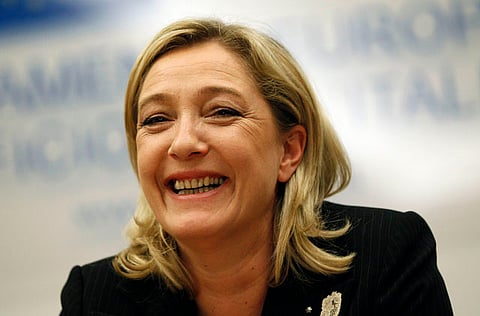French can't keep the right down
Marine Le Pen of the National Front has cast herself as the defender of secularism and women's rights

The setting was as carefully chosen as her words. Marine Le Pen, the new leader of France's National Front, dropped in to visit an immigrant-detention centre on the Italian island of Lampedusa last week, to alert the French to the ‘waves of immigration' flooding in from the Arab world. But she mixed hard talk with a disarming air of compassion.
"If I listened only to my heart, of course I would let you board my boat," she declared. "But my boat is too fragile and, if I take you, my boat will sink…Europe does not have the capacity to welcome all these illegals." The moment captured all that makes Marine such a threat: an eye for a stunt, an appeal to populist fears and, above all, a knack for dressing up intolerance as common sense.
A year before France's presidential election, the woman who only recently stepped out of the shadow of her father, Jean-Marie, is rocking the political establishment. Recently, when a poll showed that Marine would beat President Nicolas Sarkozy into the second-round run-off, his aides tried to dismiss it as an outlier. But since then other polls have found the same. Marine could squeeze out the unpopular Sarkozy with support of just 19 per cent, according to one poll. Her best first-round score so far is a hefty 24 per cent.
Although voting is still a year away, these polls are exercising many French people for a simple reason: they have already lived through the shock of electing the National Front into the second round. In 2002, Jean-Marie Le Pen, a blustering former paratrooper, beat the Socialists' candidate, Lionel Jospin, into the run-off against Jacques Chirac. Marine stands virtually no chance of winning in 2012. But she could cause trouble by pushing out one of the mainstream candidates in the first round, as her father did. And this time, both the left and the right are vulnerable.
Marine's ascension is all the more remarkable given the nature of the National Front. She is a woman in a party with a strong macho current. She is divorced, in a far-right milieu with traditional Catholic overtones. She is young, at 42, in a movement that draws heavily on older voters. Yet this lawyer and member of the European Parliament seems to be turning all this to her advantage, rejuvenating the Front and ridding it of the jackbooted imagery that clung to her father. Whereas Jean-Marie thundered about losing Algeria and dismissed the gas chambers as a ‘detail' of history, his daughter has called the Holocaust ‘the height of barbarity'. With her courteous demeanour and tempered vocabulary, she is single-handedly decontaminating the National Front brand.
Marine wants to withdraw France from the euro, and to re-erect border controls with neighbouring countries. Yet she has deftly recast her father's more toxic talk about immigration and Islam. Although she still wants to end all immigration, give French nationals preference for jobs and bring back the death penalty, out has gone the obnoxious xenophobic tone. Instead she casts herself as the defender of cherished French principles: laïcité (secularism) and women's rights.
Seeking to govern
One poll last week, by TNS Sofres, found that 38 per cent of respondents think of the National Front as a party of the patriotic, traditional right, up from 28 per cent a few years ago. Sarkozy has said his party will fire any candidate who tries to make a local electoral pact with the Front. Even so, in two-round elections in French cantons, the National Front could make it into the second round in up to 200 of the 2,000-odd constituencies, not only in the south, its traditional base, but in the old industrial towns of the north and rural districts, too. No longer just a party of protest, the Front is seeking to govern.
What can mainstream politicians do? In the past Sarkozy reached out to far-right voters with coded talk about immigration, declaring that ‘if anybody doesn't like France, they should leave'. In 2007 this ate into Le Pen's vote, keeping him out of the run-off. In office, Sarkozy has kept at it, creating a (short-lived) ministry of national identity, tightening immigration and citizenship laws, banning the burqa and closing Roma camps. This approach seems to have reached its limits. Instead of robbing the far right of votes, Sarkozy appears now to be handing them support. Take a plan for a "national debate" on laïcité in France on April 5. Just like yet another debate on ‘national identity' two years ago, it looks more like an electoral stunt than a serious effort to reflect on the place of Islam in France.
His own voters sense opportunism. Muslims feel stigmatised. Sarkozy's ‘diversity' adviser, Abdul Rahman Dahmane, was fired last week after calling on Muslims not to renew their membership of the ruling party unless the debate was cancelled. Claude Guéant, the interior minister, had to go to the Paris Mosque last week to calm matters. Meanwhile the National Front is quietly reaping the benefit.
— The Economist



